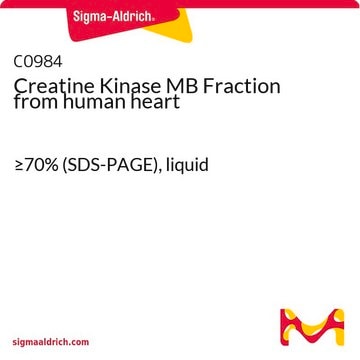MAK116
Creatine Kinase Activity Assay Kit
sufficient for 100 tests (Ultraviolet)
Synonym(s):
CK Activity Assay Kit, Creatine Phosphokinase Activity Assay Kit
About This Item
Recommended Products
usage
sufficient for 100 tests (Ultraviolet)
detection method
colorimetric
relevant disease(s)
cardiovascular diseases; genitourinary disorders; aging/geriatric diseases; orthopedic diseases
shipped in
dry ice
storage temp.
−20°C
Gene Information
human ... CKB(1152) , CKM(1158)
mouse ... CKB(12709) , CKM(12715)
rat ... CKB(24264) , CKM(24265)
Related Categories
General description
Features and Benefits
Suitability
Principle
related product
Signal Word
Danger
Hazard Statements
Precautionary Statements
Hazard Classifications
Resp. Sens. 1
Storage Class Code
12 - Non Combustible Liquids
Choose from one of the most recent versions:
Certificates of Analysis (COA)
Don't see the Right Version?
If you require a particular version, you can look up a specific certificate by the Lot or Batch number.
Already Own This Product?
Find documentation for the products that you have recently purchased in the Document Library.
Customers Also Viewed
Our team of scientists has experience in all areas of research including Life Science, Material Science, Chemical Synthesis, Chromatography, Analytical and many others.
Contact Technical Service




